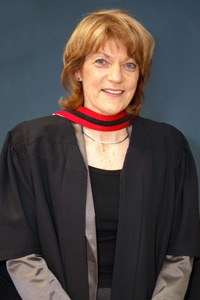Developing world needs resources to tackle intellectual disability
22 September 2009 | Story by Newsroom Professor Colleen Adnams delivered her inaugural lecture titled Intellectual Disability in South Africa: Quo Vadis? on 16 September.
Professor Colleen Adnams delivered her inaugural lecture titled Intellectual Disability in South Africa: Quo Vadis? on 16 September.
There is a dearth of research relating to issues of intellectual disability in South Africa, and government must recognise it as a public health priority along with mental health, Professor Colleen Adnams said in her recent inaugural lecture.
Adnams cited a study undertaken by Dr Maureen Durkin of the University of Winsconsin-Madison which shows that although more than 90% of children and families affected by developmental disabilities are likely to live in developing countries, the majority of research and clinical services in this area takes place in wealthier, developed countries.
This is the case in South Africa, where 3.6% of children have some form of intellectual disability and public health resources are limited. Many of these cases can be attributed to Foetal Alcohol Spectrum Disorder, a cause of intellectual disability that has been at the heart of Adnams' research and clinical work since she was appointed as Head of the Child Developmental Service in 1994.
She was instrumental in setting up Developmental Paediatrics as a national sub-speciality for this rapidly advancing clinical field.
In 2007, she was promoted to the Vera Grover Chair and Professor of Intellectual Disability in the Department of Psychiatry and Mental Health, which is the only chair of intellectual disability in Africa. Adnams has also been instrumental in initiating the MPhil in Intellectual Disability Mental Health, to commence at UCT in 2010.
In his vote of thanks, Professor Dan Stein, Head of the Department of Psychiatry and Mental Health, paid tribute to Adnams' work and described her as someone who has the means to "bring intellectual disability to the forefront". He described her as a team player, a fighter for the underdog and praised her ability to mentor other people.
 This work is licensed under a Creative Commons Attribution-NoDerivatives 4.0 International License.
This work is licensed under a Creative Commons Attribution-NoDerivatives 4.0 International License.
Please view the republishing articles page for more information.










